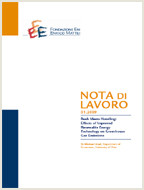The Long Italian Stagnation and the Welfare Effects of Outsourcing

22.11.2015
D43, D51, F12, F62, L13
Italy’s Economic Decline, General Equilibrium, Cournot Oligopoly, Outsourcing
Economy and Society
Carlo Carraro
The stagnation of the Italian economy over the last two decades is widely documented. During this period, the world economy has become highly integrated, and foreign outsourcing has become a standard practice for firms. While trade theory predicts benefits from the internationalization of production, Italy seems to have gained negligibly from it, or, rather to have lost. In a simple model, we show that this may be the case when markets are overregulated and competition policies are weak. We study a small open economy with one oligopolistic and one competitive sector, which outsources part of its production process abroad. Advances in globalization entail lower tariff rates of outsourcing. Contrary to the common wisdom, we show that national welfare is an inverted U-shaped function of tariffs. There exists a tariff threshold, below which the economy loses from globalization because the competitive sector overproduces and the oligopolistic underproduces (the oligopolistic good has a higher marginal effect on welfare). Competition policies that target the competitive sector lower the threshold and allow the economy to benefit from increased openness.
***
Suggested citation: Zotti, J., ‘The Long Italian Stagnation and the Welfare Effects of Outsourcing’, Nota di Lavoro 105.2015, Milan, Italy: Fondazione Eni Enrico Mattei
